Regulating Violent Video Games: Itã¢â‚¬â„¢s Tipper Gore Versus Dee Snider All Over Again
30 years ago, the music industry changed forever in the midst of the Parents Music Resource Heart'southward fight to identify and label explicit lyrics.
The Parents Music Resource Eye (PMRC) formed in 1984 effectually the commonage outrage of four women known for their ties to Washington political life. Founding members Susan Baker (wife of and then-Treasury Secretary James Baker), Tipper Gore (wife of senator and future Vice President Al Gore), Pam Howar (wife of Realtor Raymond Howar) and Emerge Nevius (wife of Washington City Council Chairman John Nevius) had become disturbed by Prince, Madonna and other music their kids were listening to. And on September 19, 1985, the culture wars came to a caput in a "porn rock" Senate hearing featuring testimony from John Denver, Dee Snider and Frank Zappa.
From this political fervor emerged the "Parental Advisory" sticker that probably dots your CD collection today. In this oral history, Susan Bakery, Dee Snider, Gail Zappa, Sis Levin and others tell the inside story of how information technology happened—and reflect on the xxx years that have gone by.
All of the material contained in this oral history was provided in the form of separate phone interviews with Newsweek, with three exceptions. Tipper Gore declined to be interviewed but did supply a statement through a representative. Cronos, of the metal band Venom, responded to interview questions via email. And the quotes attributed to the late Frank Zappa are from the artist's autobiography, The Real Frank Zappa Book. (The book was written in the late 1980s, hence the use of the present tense when referring to the then-active PMRC.)
Susan Bakery, co-founder of the PMRC: It started considering 1 twenty-four hours my vii-year-old came in and started quoting some of Madonna's lyrics to me, wanting to know what they meant. And I was shocked. I knew that you had to be concerned almost movies and TV, simply I didn't have a clue that my 7-twelvemonth-old would be exposed to inappropriate songs.
Pam Howar, co-founder of the PMRC: I had a daughter. And anything delivered through music tin be pretty powerful.
Susan Bakery: It was "Similar a Virgin." She [my daughter] said, "Mama, what's a virgin?" And I said, "What do you mean?" She said, "Well, Madonna sings this song: 'Like a virgin / Touched for the very starting time time.' What'southward a virgin?" I was speechless. Here she was still playing with dolls at 7.
Frank Zappa, musician and composer (in The Real Frank Zappa Book): In that location are several "historical accounts" from which to cull. Let'south arbitrarily choose this i: I solar day in 1985, Tipper Gore, wife of the Autonomous senator from Tennessee, bought her viii-year-old daughter a copy of the soundtrack album to Prince's Purple Rain—an R-rated film which had already generated considerable controversy for its sexual content. For some reason, however, she was shocked when their daughter pointed out a reference to masturbation in a song called "Darling Nikki." Tipper rounded up a agglomeration of her Washington housewife friends, well-nigh of whom happened to be married to influential members of the U.S. Senate, and founded the PMRC.
Sis Levin, executive director of the PMRC: I did a doctorate in conflict resolution in nonviolence. Which I teach at the university level all over the place. The fit is that the music is a form of violence in our children.… I took a desk and we had meetings and we talked well-nigh having opportunities to speak to the public. We would say, "Just mind to what they're listening to! And get a handle on it!" Because it does have an result.
Susan Baker: We decided nosotros would gather and get everybody on our address list and have a coming together and evidence them what we were upset virtually. Well-nigh of them didn't have a clue what was going on. That's how information technology started. Nosotros had no idea we were going to start an organisation. We were only mad mamas who wanted our friends and, specially, educators to know what kind of trash our children were buying. We felt we needed some data [in the course of] product labeling.
Kandie Stroud, journalist and PMRC spokeswoman who debated Frank Zappa on Television receiver: We were a family unit completely saturated in music. I remember one fourth dimension, i of my kids said, "Mind to this song, but don't heed to the lyrics, mom, you won't like them." Sure enough, information technology was some explicit song. I recollect it was something past Prince. I kind of looked into the topic and interviewed a agglomeration of different people in the music world. I thought, "Wow, information technology's really changed since the days of the Beatles and Elvis."
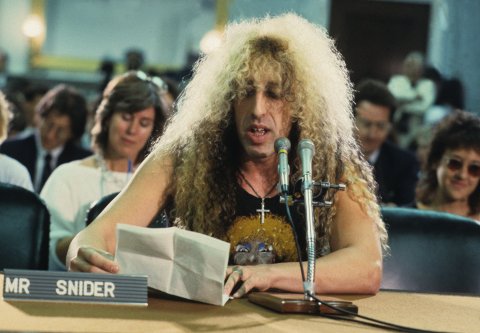
The PMRC gear up to work compiling contacts from their respective Christmas card lists and issuing press releases. The group sent a letter to the Recording Manufacture Association of America (RIAA) and more than l record labels. According to A History of Evil in Popular Culture, "The alphabetic character proposed that record companies either finish the production of music with vehement and sexually charged lyrics or develop a motility picture-style ratings arrangement for albums.… Violent lyrics would be marked with a 'V,' Satanic or anti-Christian occult content with an 'O,' and lyrics referencing drugs or alcohol with a 'D/A.'"
In 1985, the PMRC issued a list of 15 songs—nicknamed the "Filthy Xv"—which it deemed particularly objectionable and deserving of existence banned from radio airplay. The Filthy Xv included songs by household-name pop stars like Madonna, Cyndi Lauper and—of class—Prince's "Darling Nikki." Information technology also took aim at heavy metal, targeting lesser-known groups Due west.A.S.P., Venom and Mercyful Fate. The listing included Twisted Sister's "We're Not Gonna Take It," which had become a hit single and video on MTV in 1984.
Susan Bakery: Our goal in the beginning was simply to alarm people.… Nosotros just said, "Well, we'll get-go this grouping and see if we can get some labeling or some ratings. Kind of like movies." Within the start five or six months, we talked to Stan Gortikov, caput of the RIAA. So we were working with him, and within a year they agreed that they would practice something. One year afterward, they really weren't doing much of anything. When they were putting labels on things, they were real small and you couldn't read them. We had a big-time meeting with him. And past that time, nosotros had a lot of publicity—in Newsweek and on the Television with Oprah and different things, Adept Morning America. People were really getting riled upwards about it. Some legislators were even introducing bills to have in their state and then they would take to have certain things on the labels.
Cerphe Colwell, longtime Washington, D.C., radio personality who testified at the PMRC hearing: Ironically, most of the heavy metal songs that they listed at the fourth dimension were virtually unknown to the public. Heavy metallic as a music format hadn't really blossomed. I truly believe to this day that 1 of the reasons that metal took off and then much in the 1980s equally a successful format is that the PMRC brought attending to what they thought was unacceptable, and of class that made information technology very much in the spotlight.
Cronos, singer for the Filthy Fifteen-targeted Venom: I was told about the PMRC during a recording session in the '80s, and I thought someone had subconscious cameras, like pulling a prank on me to come across my reaction, and then I dismissed it as bollocks. Then, when I found out they were real, I couldn't understand how supposedly intelligent people could exist so ignorant. Of class stone and roll has all of the subject affair they accused it of having. Information technology's stone and whorl! It'due south supposed to be hard-core and edgy. Nigh of united states rockers accept families, and we are responsible parents. We don't need the PMRC doing our jobs of protecting our kids from the harmful shit in this world. I would take been more upset if one of my songs or albums had not taken pride of identify on their list.
Dee Snider, frontman for the Filthy 15-targeted Twisted Sis: You talk about the music that was on the Filthy Fifteen, it's easy listening by today's standards. It's more than ironic that in the picture show Stone of Ages, the Parents Music Resources Center-esque group headed by Catherine Zeta-Jones sang "Nosotros're Non Gonna Take It" at the stone star! That's irony in its purest form.
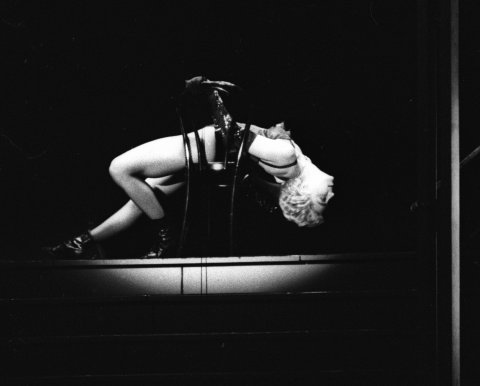
Susan Baker: We went all over the country talking to PTA groups and parent groups. And we'd say, "Look. This kind of inappropriate stuff is going to exist out in that location in the culture. So yous have to teach your kids to call up critically nearly it."
Blackie Lawless, vocaliser for the Filthy Fifteen-targeted W.A.S.P.: Information technology's true, they made us a household give-and-take. But they made the states a household word of people'southward grandmothers in the Midwest. Because the kids already knew who we were. The kids already had the records. Yep, they make you a household word to somebody's grandma, but grandmas don't purchase records. I call up a lot of artists thought, OK, this exposure'southward gonna assist us sell more records. But I don't think in reality it did. I know it didn't for us.
Joanne McDuffie, singer for the Filthy Fifteen-targeted Mary Jane Girls: I thought it was weird. It was like, "Really?"… When they picked that song ["In My House"], I remember beingness actually, actually irritated, because in that location was nothing in the song that would suggest anything inappropriate. Was the song near sexual activity? Of grade information technology was. But lyrically, information technology was very tastefully washed. It wasn't something that would brand your kids go, "Oooh, I'k gonna go figure out what she's talking nearly."
Blackie Lawless: I'thou coming from a whole different perspective considering I don't know if y'all're aware or non, simply I'm a built-in-again Christian. I've not played that song ["Animate being (Fuck Like a Animal)"] for almost 10 years. That song would non be something I would want to exist represented as.
Joanne McDuffie: I think information technology was a blacklist. Or a modernistic-mean solar day witch chase. Or an effort at censorship for certain artists and certain songs. When I look at what happened, it didn't stop the airplay.… What it did stop was our consideration for the awards that I think any other creative person of our stature or our popularity would have gotten.
On September 19, 1985, the PMRC'due south efforts culminated in a much-publicized Senate hearing to consider the group'due south proposal. There, Tipper Gore advocated for "a alarm label on music products inappropriate for younger children due to explicit sexual or violent lyrics." Alongside members of the PMRC, the Senate Commission on Commerce, Science, and Transportation heard testimony from three popular musicians: Frank Zappa, Dee Snider and John Denver.
All three argued voraciously against what they characterized as censorship. In perhaps the most enduring testimony from the hearing, Zappa described the PMRC's proposal equally "an ill-conceived piece of nonsense which fails to deliver whatsoever real benefits to children, infringes the civil liberties of people who are not children and promises to keep the courts busy for years."
Dee Snider: I just remember getting a phone call from my direction office request, "Would you testify at these hearings?" And I was like, "Hell, yeah." I assumed this would be, like, young people would ascension upward! And I was being asked to conduct the flag. Didn't give it a 2d thought. "Yes, I volition comport the flag into boxing. Follow me!" Every bit I stood out there past myself on the field of honor, I realized that nobody was following.
Susan Baker: Tipper and I were the ones that testified. It gave us more exposure, which we were hoping for. It was kind of a circus.… We were called awful things. They called usa bored housewives and a agglomeration of crazy alcoholics. Information technology was not a pleasant thing. But nosotros said, "Well, so what? We think this is correct." We just soldiered on. Like I said, the 4 founders really felt like nosotros'd fabricated progress and achieved something.
Cerphe Colwell: I got a call from Frank Zappa and he said that he was testifying. Evidently somebody in his circle said that the PMRC, which was part of a Senate select subcommittee, was looking for some music experts. I was sort of a become-to guy. At that point I'd been on radio in D.C. for possibly 16, 17, 18 years. I played Frank's music and Frank had been a invitee on my show many times. I jumped at the hazard.
Larry Stein, attorney for Frank Zappa: [Zappa] was asked to, and he definitely wanted to because he felt very strongly near the upshot. Then we accustomed the invitation for him to testify, prepared for it and went back there and testified. And my 15 minutes of fame is that when that MTV prune plays, he walks into the Senate and says, "Hullo, my name is Frank Zappa and this is my lawyer, Larry Stein." The only picture of a client that I actually have in my office is the movie of Frank and me at the U.S. Senate.
Gail Zappa, Frank Zappa's widow: They were maxim that they were going to have a hearing. And that pissed Frank off because it was a waste product of resources and expenses to get involved in censorship of people's artwork, apart from everything else. He was pissed.
Dee Snider: The majority of fans just didn't get the significance of what was going on. "At present we know what records to buy!" That was the battle weep of the teens. "Nosotros know what records the cool records are!" Bullshit.
Larry Stein: It was fun getting Frank ready for his testimony. We believed that he would be taken much more seriously if he looked a little more pragmatic. Information technology was kind of fun if you see this movie of me and Frank together. This particular picture, his pilus looks short, he's wearing a white shirt and a reddish necktie and a dark suit. When people come into my office, I wait like Don Johnson during the Miami Vice period. My tie is a fiddling scrap downward, and I'm wearing a silvery tie and people frequently come in and go, "Which ane was the lawyer in that picture show?" Frank knew what he had to do.
Dee Snider: I never met John [Denver].… I call back Frank and I continuing back.… We were both not sure where John would be in this. We knew where he should exist, as an artist—he should exist on our side. Merely, again, he had crossed over, and he was literally that day coming back from NASA, where they were talking about him existence the starting time musician in infinite.… So when he came out and spoke—and he spoke honestly near the way "Rocky Mountain Loftier" had been protested and the picture Oh, God! had been protested and he stood against censorship of any kind—we were cheering in the dorsum.
Frank Zappa (in The Real Frank Zappa Book): My just regret virtually that episode is that, nether the rules of the hearing, I was not afforded an opportunity to respond when I was denounced by a semiapoplectic Slade Gorton (one-time Republican senator from Washington state) for my "constitutional ignorance." I would have liked to remind him that although I flunked just about everything else in high schoolhouse, I did become an 'A' in Civics.
Slade Gorton (former senator from Washington): I didn't so much debate with [Zappa]. I told him what I idea of him and his language. Y'all would have to look at the record of the hearings to get all of it. I just call up I attended the hearings. Senator Gore was a fellow member of the committee. Frank Zappa was admittedly insulting and, I think, profane in his reference non merely to their ideas but to them as individuals. The woman's husband didn't defend them. And I got very angry and did so.
Susan Baker: Some of [Zappa's testimony] was ludicrous. Merely John Denver was there, too. We empathise how people feel. It's free speech! But we say, yes, speech is free. Simply when you purchase a product in the store, information technology has a label on it that tells you lot what the ingredients are.
Slade Gorton: I accept held Al Gore in utmost contempt ever since that 24-hour interval. He was on the committee and refused to defend his own wife.
Dee Snider: Gotta give John Denver [credit]. His testimony was one of the most scathing, because they fully expected—he was such a mom-American-pie-John-Denver-Christmas-special-fresh-scrubbed guy. Everyone expected that he would be on the side of right—correct being censorship. When he brought up, "I liken this to the Nazi book burnings"—that's what he said in his testimony—you should've seen them start running for the hills! His testimony was the well-nigh powerful in many ways.
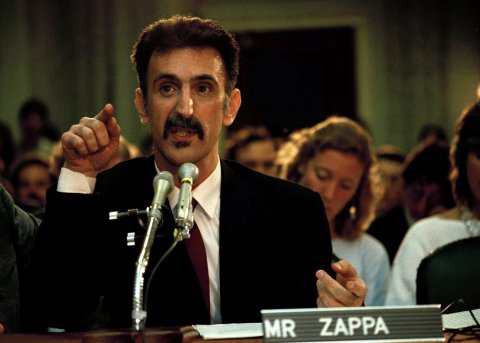
Dweezil Zappa: The whole experience of that was that we watched our dad become up against these people and just speak in a way that was swell, considering he went straight to the root of the problem. That'south why it was great to hear him make remarks like that. He had one quote that was hilarious, where he said to the senators something to the upshot of, "You are treating this problem like treating dandruff by decapitation."
The Senate hearings attracted a wealth of national media attention. In the backwash, Frank Zappa appeared on TV several times, debating PMRC supporters. (Memorably, during a Crossfire appearance, he responded to a barb from Washington Times columnist John Lofton with: "How virtually yous kiss my ass?") Zappa seemed to relish the opportunity to state his case while Snider resented that the politics overshadowed the music. Meanwhile, the PMRC succeeded in establishing the blackness-and-white Parental Advisory characterization, which began actualization on anthology covers at the discretion of private labels. The PMRC gradually faded by the time Al Gore ran for president during the 1988 election.
Frank Zappa (in The Real Frank Zappa Book): A CNN show called Crossfire covered the PMRC topic twice with me every bit a guest, the kickoff time in 1986 (when I told that guy from The Washington Times to kiss my ass), and so once again in 1987, when George Michael's sex song was "controversial." Believe it or not, ladies and gentlemen, the premise of that 2nd contend on Crossfire was (don't laugh) "Does Rock Music Crusade AIDS?"
Kandie Stroud: I was asked by Charlie Rose to come on the show. If you lot want to call information technology a debate, telephone call it a contend. He [Zappa] was not an ennobling human being being. He made statements equally far as I can remember similar "This is about the Outset Amendment." It wasn't about the First Subpoena. I'm a journalist, don't you think I support the Beginning Amendment? It was about parental guidance [and] the music industry beingness responsible for what they poured into children'south minds.
Dee Snider: It's a horrendous effect. Everything I feared and more. When I went to Washington, my business was it wasn't about informing parents. Information technology was that the sticker would be misused. The business was that it would be used to segregate records. To keep creative artists' piece of work from the general public. And true to form, stores wouldn't rack certain records.
Cerphe Colwell: Just as Frank had predicted, many stores, including Walmart, stopped carrying the dreaded, demonized records-carrying labels.
Gail Zappa: He did say that when these hearings were over, a lot of artists were going to get their contracts canceled. And, ironically, Frank was the showtime one that that happened to. Immediately after the hearing. They wanted his piece of work to conform, and Frank provided a sticker that guaranteed that you wouldn't end upward in hell if y'all listened to the lyrics. And they did not consider that sufficient. It was MCA that canceled his contract. They were offended by the linguistic communication.… In 1987, Frank won a Grammy. In order for the committee to consider it—in guild to be considered for a Grammy—record companies or artists submit copies of the record to various committees that would make determinations or vote on that particular record'southward eligibility. And so in the case of Jazz From Hell, they said, "Well, how come this doesn't accept a sticker on it?" I said, "Why should it have a sticker?" "Well, shouldn't Frank'southward music be censored?" Well, really? Want to run that by me again? It turned out that nobody had listened to information technology. It's all instrumental.
Though the Parental Informational labels are largely obsolete 30 years afterwards, the question of the PMRC's lasting legacy remains. PMRC members interviewed for this article say they're proud of the work they accomplished. They feel they succeeded in promoting parental awareness of explicit lyrics; Susan Bakery says it however gives her a smile when she sees a Parental Advisory sticker and knows she helped make that happen. But some of the artists targeted past the organisation describe career downturns, characterization woes and—in some instances—death threats in the backwash of the hearings. Prince and Madonna, meanwhile, are still playing "Darling Nikki" and "Like a Virgin" three decades later. Madonna performed "Virgin" Wednesday night at Madison Square Garden. Her latest album, Insubordinate Heart, comes sealed with a "Parental Advisory" sticker.
Tipper Gore, co-founder of the PMRC: In this era of social media and online access, information technology seems quaint to recall that parents can accept control over what their children see and hear. But I think this conversation between parents and kids is as relevant today as information technology was back in the '80s. Music is a universal linguistic communication that crosses generations, race, organized religion, sex and more. Never has there been more demand for communication and understanding on these problems as at that place is today. All of the artists and tape companies who nonetheless utilize the advisory label should exist applauded for helping parents and kids have these conversations near lyrics around their own values.
Susan Baker: [PMRC] stopped existence operational about the mid-'90s. I moved and came back to Texas. Nosotros did what we felt we could do. We experience like we made a contribution.
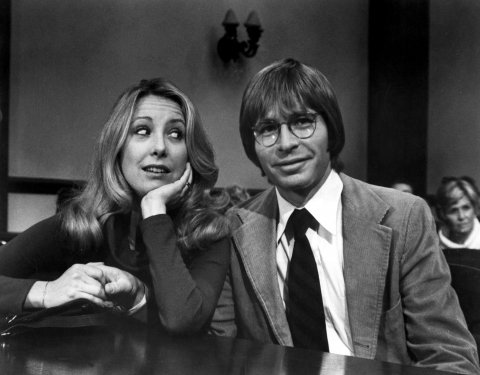
Sis Levin: All I can say is, it was a group of courageous women who were willing to step out in that location and say, "This is bad, this is hurting our children, this is having an effect on not just the homes and the schools but the whole community. We need to take a serious wait at this." That was pretty gutsy of them.
Joanne McDuffie: It kind of blacklisted me from sure areas of the concern.… We didn't get the Grammys. Nosotros didn't get the American Music Awards, because of [the PMRC]. It cutting me off at a certain signal. I retrieve that kind of stopped us before we got started. It stopped everything so that now at that place are only certain audiences who know virtually [our music]. Because information technology might accept not played in sure areas or on certain radio stations. I think it hurt me.
Frank Zappa (in The Real Frank Zappa Volume): If the scare tactics of groups like the PMRC and Back in Command have not made an bear on on musicians, they accept certainly made one on the executives of the record companies who can tell artists what the labels volition or will not take equally suitable material nether the artist's contract.
Blackie Lawless: I used to tell people that I felt like a brick wall, that nobody could knock me downwardly. Merely it's very subtle the way it happens. A death threat here, somebody tampering with one of your vehicles there. Information technology's not similar someone tries to knock downwardly your wall overnight. They have away one brick every 24-hour interval. And and so pretty soon, you plough effectually and you await backside y'all [and] at that place'due south no more bricks in your wall. It concluded up making me more of a recluse than anything.
Joanne McDuffie: Our song had the potential and was on its fashion to beingness No. i. When they put that sticker on it, I think it perhaps stopped at five. It definitely stopped us from going to No. 1.… I recall having an endorsement at the fourth dimension from Ford Motors. But afterward this labeling thing, it disappeared.
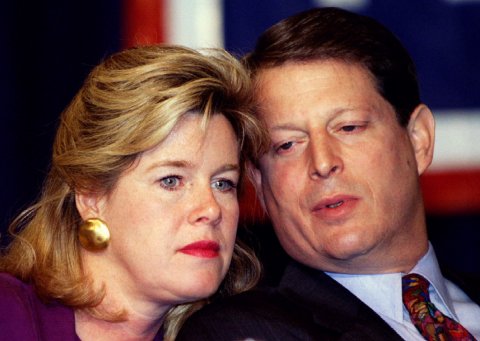
Dweezil Zappa: Oddly plenty, during the Clinton administration, we did have several occasions to spend some time with the Gores and actually became friends with them. It was never a boxing of, "Oh, these people are terrible people."
Dee Snider: I feel a certain responsibility to acquit the torch. It was certainly something that the Gores tried very hard to sweep under the rug when he was running with Neb Clinton for the vice presidency.
Susan Baker: Tipper did non back away from the work that we'd done in the PMRC when Al was running for president, even though she got a lot of flack. Some of the people in his entrada seemed to walk back a fiddling chip.
Joanne McDuffie: Let's go dorsum to why they created this whole agency. Information technology was for parents to control what your children were listening to. I was a parent at the time! That was my job. I was a unmarried parent. I had a daughter and a son at the time. I'g gonna be mindful of what I'thou singing because these kids are gonna abound up. I didn't want them to be ashamed of anything I was doing, nor did I want to be.
Dee Snider: Long-term, it was the get-go time people started to see me as having more to say than just a couple of catchy tunes. That I had a encephalon. A day doesn't go by that somebody doesn't walk up to me and say, "Thank y'all! For doing what you lot did."
Susan Baker: When we're traveling, sometimes somebody volition come up upward to me when they find out who I am and they say, "We really thank you lot for doing that. Thanks for making us more than aware."
Source: https://www.newsweek.com/2015/10/09/oral-history-tipper-gores-war-explicit-rock-lyrics-dee-snider-373103.html
0 Response to "Regulating Violent Video Games: Itã¢â‚¬â„¢s Tipper Gore Versus Dee Snider All Over Again"
Postar um comentário